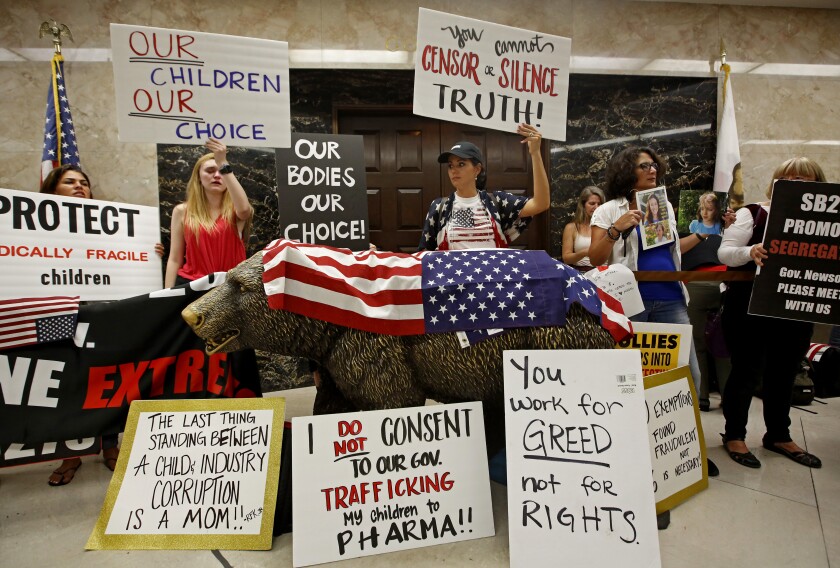Opponents of legislation to tighten the rules on medical exemptions for childhood vaccinations demonstrate outside the office of California Gov. Gavin Newsom on Sept. 9. Newsom signed the bill, SB 276, that same day.(Rich Pedroncelli / Associated Press)
By MELODY GUTIERREZ, TARYN LUNA, JOHN MYERS • SEP. 22, 2019
SACRAMENTO — Most everyone who heard Gov. Gavin Newsom's words had the same reaction: He's finally on board.
After two frenetic weeks spent rewriting a high-profile plan requiring more California schoolchildren to be vaccinated, making changes to Newsom's specifications, legislators and advocacy groups breathed a sigh of relief on June 18 when reporters asked the governor about his support for the proposal.
"All those amendments, if they're made, stamp of approval," Newsom said.
But 78 days later, hours before a crucial legislative vote, the governor's advisors abruptly told lawmakers he wanted more changes — and they were substantial.
Of the more than 2,600 bills introduced this year in the California Legislature, none captured the public's attention like Senate Bill 276. Prompted by an alarming rise in measles cases and allegations of questionable vaccine exemptions, it was the legislative equivalent of a Rorschach test. Some were convinced they saw it as government overreach, others as a victory for science over social media-fueled skepticism. Along the way, it became a measurement of Newsom himself — the charismatic new governor who had yet to establish firm relationships with many of his fellow Democrats in the Legislature.
The Times interviewed more than two dozen people involved in the private negotiations and public debate over SB 276, including legislators, state Capitol staffers, lobbyists and advocates. Their accounts detail missteps in the governor's office, erratic communication among decision-makers and the emergence of a devout lobby of parents as a political force in Sacramento.
Long before Newsom's surprise decision, SB 276 had sparked a fierce debate over public health and parental rights. Lawmakers received thousands of calls and emails and were tagged in a steady flow of social media posts. The tone was often hostile, if not menacing: Several legislators were subjected to taunts and threats by those who insisted vaccines were harmful or that inoculation mandates were part of a secret plot by pharmaceutical companies and government officials.
The Democratic legislator who wrote the bill was physically accosted outside of a Sacramento restaurant. On the final night of the legislative session, a protester threw a menstrual cup filled with what the California Highway Patrol said "appeared to be blood" onto state senators from a visitor's gallery, prompting the Senate chamber to be evacuated.
Enacting SB 276 into California law was never going to be easy. But some of those involved felt that Newsom's evolving position over a carefully crafted bill inflamed the debate — giving hope to critics that he would block the bill and pause to supporters about the governor's backing for what they saw as a vital issue of public health.
A new Capitol fight to boost vaccine rates
State Sen. Richard Pan (D-Sacramento), who led a 2015 fight over vaccine exemptions for schoolchildren, wasted little time after the Legislature convened this year in laying out the reason for launching a new war to increase vaccine rates. When he introduced SB 276 in March, the Centers for Disease Control and Prevention had reported a surge in new cases of measles during the first three months of the year, bringing the total in the United States to more than 500. The pace at which the highly contagious disease was spreading worried public health experts. The number of cases nationwide had already surpassed all of those reported in 2018.
State Sen. Richard Pan (D-Sacramento) calls on lawmakers to approve his measure to toughen the rules for vaccination exemptions in Sacramento.(Rich Pedroncelli/AP)
California created some of the toughest inoculation laws in the country in 2015 with Pan's Senate Bill 277, allowing children to skip vaccines only when a doctor determines there is a medical reason to do so. But public health officials said the state's progress was being undermined by an increasing number of questionable exemptions.
Please go to Los Angeles Times to read the entire article.
________
Ed.'s note: Sen. Richard Pan is just about as corrupt as they come in California. Pan takes big money from health care companies and big pharma with huge stakes in California. Yes, health care is a concern, but you don't get "health care" by increasing vaccination quotas for big pharma. You get health care through personal responsibility by taking care of yourself and your family and not leaving that up to the state and private pharmaceutical companies that have profits as their bottom line. If Pan's concerns are about unvaccinated migrants pouring into California, then go after them and not California's families with children. There is no out break of measles that would jeopardize the entire population in the state fo California. That alleged measles outbreak is being highly exaggerated in the media and big pharma.
Drug companies donated millions to California lawmakers before vaccine debate
Public's Anger Toward And Loss Of Trust In Big Pharma Is Adding Fuel To The Fire Of Measles Outbreak
Sen. Richard Pan reminds us of this and needs to be removed from the California legislature:
Servitors of Empire: Studies in the Dark Side of Asian America

No comments:
Post a Comment
Note: Only a member of this blog may post a comment.